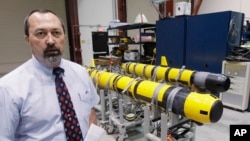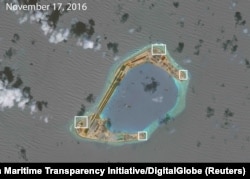China says it will hand over an underwater U.S. drone it seized in the international waters of the South China Sea, prompting President-elect Donald Trump to say the United States should tell China to keep the device.
Trump does not assume power for another month, but weighed in on the maritime incident in which Chinese naval forces seized the unmanned submersible while it was collecting unclassified scientific data on Thursday. U.S. authorities protested that the seizure was unlawful and demanded the drone's immediate return, which Chinese authorities agreed to do.
Trump, in a Twitter comment on the initial seizure, declared, "China steals United States Navy research drone in international waters — rips it out of water and takes it to China in unpresidented act," later correcting the remark to call it "unprecedented." After China promised to return the vehicle, he tweeted that the United States "should tell China that we don't want the drone they stole back. — let them keep it!"
Arizona Senator John McCain, chairman of the Senate Armed Services Committee, told CNN on Sunday that the seizure of the drone was a "gross violation of international law."
Taiwan call
Trump earlier this month angered Beijing by accepting a call from Taiwan President Tsai Ing-Wen congratulating him on his election, the first time a U.S. president or president-elect had spoken to a Taiwanese leader since 1979. The practice is in keeping with a "one-China" policy in which the United States recognizes Beijing as the only government of China.
Notwithstanding Trump's comments about the drone, China maintained it was blameless and accused Washington of "hyping" the seizure in an "inappropriate and unhelpful" manner.
China's Defense Ministry said a Chinese naval vessel sighted a piece of "unidentified equipment" in the water and retrieved it for the sake of "navigational safety." Only later, the ministry said, was the object discovered to be a U.S. drone.
Chinese defense officials said Saturday the U.S. equipment will be returned "in an appropriate manner," but gave no details. The Pentagon confirmed there was "an understanding" with the Chinese.
South China Sea
The drone incident has raised new concerns in Washington and among Asian allies about China's stepped-up military presence in the South China Sea, and what critics call Beijing's aggressive responses to competing maritime claims in the region.
Brunei, the Philippines, Vietnam and Malaysia all claim mineral and fishing rights in the region, and many of those claims overlap. China seized the device in waters 90 kilometers northwest of the Philippines' Subic Bay.
Protecting shipping lanes
While Washington has taken no official stance on the rival sovereignty claims, the U.S. Navy has sought to protect the region's busy international shipping lanes. The administration of President Barack Obama has also challenged China's efforts to boost its maritime presence with military hardware deployed in areas claimed by other regional governments.
New satellite imagery released by the U.S. Center for Strategic and International Studies shows China has installed weaponry, including anti-aircraft and anti-missile systems, on seven artificial islands it has built in the South China Sea during the past several years.
During his campaign for the presidency, Trump threatened to force dramatic changes in U.S.-China trade policy, which he blamed for large numbers of American job losses.
After his call to Taiwan's leader, Trump said he would consider linking his continued support for the "one-China" policy to improved cooperation from Beijing on trade and other issues.








